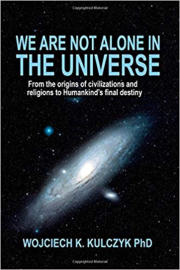

We are not alone in the Universe
The
author,
while
living
in
Portugal
came
into
contact
with
a
book
describing
the
events
in
Fatima,
such
as
the
display
on
the
sky,
which
was
witnessed
by
50,000
people.
As
a
physicist
specialising
in
lasers,
he
came
to
the
conclusion
that
these
events
were
neither
of
natural
nor
divine
origins,
but
had
to
be
prepared by beings of much higher than human intelligence.
Following
this
hypothesis
he
arrived
at
the
logical
conclusion
that
the
intelligent
beings
had
intervened
in
human
affairs
from
the
very
beginning
of
Homo
Sapiens
on
Earth.
His
book
explains
many
mystifying
events
in
the
history
of
mankind
such
as
the
origins
of
the
first
civilisations
and
the
arising
of
the
main
religions.
Certain
events
in
the
20th
century
such
as
the
fall
of
Nazism and Communism are elucidated using this approach.
This
book
tries
to
answer
the
questions:
Why
are
intelligent
beings
interfering
in
human
affairs?
What
are
their
objectives?
And
provides
an
answer
to
the
timeless question as: “What is the purpose of human life?”
Synopsis

Chapter by Chapter Summary
Chapter
1
is
devoted
to
the
analysis
of
the
events
in
Fatima.
These
events
are
briefly
described,
especially
the
display
in
the
sky
which
was
observed
by
tens
of
thousands
of
spectators.
The
purpose
of
this
chapter
is
to
convince
the
reader
that
the
events
in
Fatima
are
genuine,
very
well
substantiated
and
confirmed
by
many independent and reliable witnesses.
Chapter
2
explains
how
the
Fatima
apparitions
could
be
prepared
using
the
current
state
of
the
art
technologies.
The
purpose
of
this
chapter
is
not
to
prove
that
the
apparitions
were
prepared
in
the
suggested
way,
but
that
could
be
carried out using current techniques.
Chapter
3
proposes
how
the
display
on
the
sky
could
be
arranged.
The
detail
analysis
of
the
witnesses’
statements
confirms
that
images
could
be
generated
using lasers.
Chapter
4.
The
uniqueness
of
the
Fatima
events
is
discussed
by
showing
that
they
were
predicted
in
the
Portuguese
press
2
months
in
advance
and
a
day
before
the
apparitions.
The
display
on
the
sky
was
predicted
3
months
in
advance.
The
importance
of
predictions
on
the
authenticity
of
these
events
is
analysed.
Chapter
5.
To
show
that
the
Fatima
apparitions
differ
from
other
known
apparitions,
events
which
took
place
in
La
Salette,
Lourdes
and
Medjugorje
are
analysed.
Chapter
6.
In
this
chapter
is
included
a
critical
analysis
of
the
UFO
phenomena,
because
a
recently
published
book
suggests
that
in
many
respects
the
Fatima
events
resemble
observations
of
Unidentified
Flying
Objects.
In
order
to
evaluate
this
hypothesis,
there
are
discussed
a
few
of
the
most
typical
and
best
substantiated UFO observations which were recorded during the last 70 years.
Chapter
7
deals
with
the
question
“Who
was
responsible
for
the
events
in
Fatima?”.
Analysis
shows
that
they
could
be
neither
of
natural
nor
divine
origins.
It
is
proposed
that
the
apparitions
in
Fatima
could
be
organised
by
intelligent
extraterrestrial beings.
Chapter
8.
Issues
associated
with
the
searches
in
the
universe
for
extraterrestrial
civilizations
are
briefly
discussed
because
they
are
relevant
to
my
hypothesis.
It
is
shown
that
the
notion
of
the
existence
of
extraterrestrial
civilizations
is
supported by the scientific world.
Chapter
9.
The
organisation
of
the
events
in
Fatima
from
the
point
of
view
of
the
modern
project
management
is
presented.
It
shows
that
there
were
used
current
marketing techniques.
Chapter
10.
The
purpose
of
the
Fatima
events
is
analysed
and
it
is
shown
that
they were necessary to help Portuguese to preserve their traditional values.
Chapter
11.
The
principles
of
the
intelligent
beings
intervention
are
discussed
and
its
limitations
are
described.
The
objectives
of
such
interventions
are
outlined.
Chapter
12.
The
Sumerian
civilization
is
described
in
more
detail,
with
emphasis
on
its
beginnings
and
the
early
periods
of
its
development.
Immense
achievements
of
the
ancient
Sumerians,
specially
their
influence
on
the
development
of
democracy,
justice,
ethics,
humanitarianism
and
of
many
contemporary
social
institutions
are
also
considered.
The
link
between
the
Bible
and the Sumerian legends is briefly described.
Chapter
13.
The
achievements
of
the
Egyptian
civilization
are
expounded,
with
emphasis
on
the
development
of
justice,
ethics,
religion,
engineering
and
medicine. A very unusual privileged position of women is expanded on.
Chapter
14.
The
legacy
of
the
Sumerian
and
Egyptian
civilizations
is
discussed
and
shown,
that
both
these
civilizations
are
not
appreciated
by
the
present
historians.
The
link
between
the
Greek
discoveries
and
the
Egyptian
knowledge
is
established,
and
the
importance
of
the
Alexandria
as
the
original
source
of
the
Greek achievements is mentioned.
Chapter
15.
In
this
chapter
are
expounded
existing
hypothesis
of
the
origins
of
the
first
civilizations.
The
political
correctness
of
the
academic
theories
is
pointed
up.
Chapter
16.
The
genesis
of
the
first
civilizations
is
discussed,
which
is
the
most
enigmatic
and
inexplicable
event
in
the
history
of
humanity.
The
presented
novel
hypothesis
of
the
origins
of
the
first
civilizations
is
based
on
archaeological,
linguistic
and
genetic
research
findings.
Is
proposed
the
existence
of
the
protocivilization
which
preceded
the
first
civilizations
on
earth.
The
spread
of
civilization on the Euro-Asian continent is outlined.
Chapter
17
is
concerned
with
a
special
type
of
events,
viz.
coming
into
existence
of
main
religions,
such
as
Zoroastrianism,
Judaism,
Buddhism,
Christianity
and
Islam.
There
are
presented
local
social
conditions
and
beliefs
existing
before
the
formation
of
religions.
It
is
shown
that
religion
was
an
essential
step
in
the
development
of
the
humanitarian
values
and
the
advancement
of
mankind.
The
role of religion in controlling the human behaviour is discussed
Chapter
18.
Zoroastrianism
is
shown
as
the
first
religion
effectively
controling
behaviour
of
people.
The
principles
of
the
Zoroastrian
religion
are
summarized
and its connections with all main religions are emphasised.
Chapter
19.
Hinduism,
the
precursor
of
Buddhism
in
India
is
described
and
its
system
of
casts
is
critically
evaluated.
Buddhism
is
presented
as
the
most
revolutionary and advanced philosophy of life.
Chapter
20.
Connections
between
Judaism
and
the
Sumerian
and
Egyptian
cyvilizations are presented. The role of Moses is expounded.
Chapter
21.
Beliefs
in
the
Greco-Roman
civilization
are
outlined.
The
birth
and
consolidation
of
Christianity
-
the
most
innovative
and
revolutionary
religion
-
as
a
result
of
the
activities
of
Jesus,
St
Paul
and
the
emperor
Constantine
the
Great is discussed.
Chapter
22.
The
origins
of
Islam
are
briefly
described
as
a
result
of
the
prophet
Muhammad revelations. The principles of Muslim beliefs are outlined.
Chapter
23.
The
mysterious
decision
of
the
quitting
by
the
Germans,
at
the
beginning
of
the
Second
World
War,
of
the
development
of
the
atom
bomb
is
described.
A
proposed
hypothesis,
based
on
the
new
disclosed
materials,
is
explaining its origins.
Chapter
24.
The
collapse
of
communism
in
the
Soviet
Union
belongs
to
the
great
mysteries
of
the
20th
century.
Even
Gorbachev,
who
presided
over
the
collapse
of
the
Soviet
Union,
is
not
able
to
explain
it
in
a
convincing
way.
In
this
chapter
a
new
interpretation
of
the
extraordinary
career
of
this
politician
is
provided,
and
the
unusual
circumstances
of
his
rise
to
power
and
his
activities
as
the
first
secretary
of
the
Communist
Party
are
explained.
A
new
hypothesis
explaining
these events is presented.
Chapter
25.
Causes
of
human
suffering
are
briefly
outlined
and
three
system,
social,
religiuos
and
legal,
which
are
controlling
human
behaviour
are
summarised.
It
is
postulated
that
a
part
of
mankind
is
facing
a
moral
and
social
crisis
and
to
overcome
this
requires
a
new
direction
for
the
advancement
of
man.
The need of the development of man’s consciousnes is justified.
Chapter
26.
Some
aspects
of
the
Nitzsche
philosophy
are
explained
with
a
special
emphasise
on
the
concept
of
the
overman.
A
new
interpretation
of
the
overman
as a man with higher consciousness is proposed.
Chapter
27.
The
main
elements
of
the
G.I.
Gurdjieff
philosophy
are
briefly
described
and
his
role
as
a
teacher
showing
a
new
way
for
mankind
is
emphasised..
Chapter
28.
Two
world
views:
religious
and
scientific
are
outlined
and
a
new
scientific
world
view
is
proposed.
A
new
concept
of
God
is
presented
and
the
effects of this new approach on the scientific and religious worlds is evaluated.
To purchase a hard copy of the book simply click on the thumbnail below
to be taken to our Amazon page.








English Polski
Lorem Ipsum Irure magna irure,
exercitation minim

© Ut duis incididunt ex officia

Logotype
Anim exercitation quis reprehenderit.
Nisi ut cillum ad dolore dolor officia magna est amet sint proident aliqua. Fugiat est nulla, id exercitation ut mollit magna. Ut labore minim do amet tempor deserunt qui adipisicing. Exercitation cupidatat, ut, fugiat commodo ea dolore mollit id. Proident in eu. Ipsum proident, deserunt irure, elit ad aliquip. Ut ad tempor, lorem, velit eiusmod sit excepteur incididunt dolore ea amet esse dolore nostrud.Sit anim aliqua in elit amet ut laboris
cupidatat officia adipisicing officia aliqua. Anim labore, sunt esse enim anim deserunt veniam dolore amet occaecat minim ullamco dolore. Dolor cillum quis aliqua labore magna non exercitation dolore labore aute.Products

Deserunt voluptate cillum, laboris
culpa nostrud ad, sunt quis. Labore
ex minim occaecat ut.
Velit in consectetur irure deserunt sit,
ea do ut ea in mollit veniam
Esse id irure nisi consequat
voluptate. Qui, ea nisi.
Exercitation officia exercitation non
lorem, exercitation fugiat




Lorem ipsum dolor
Commodo velit pariature
In sed adipisicing magna officia
Commodo velit pariature
Veniam dolor qui
Nostrud nisi velit aliquip








- Home
- wearenotalone
- downloads
- blogs
- info
- About
- gur
- the new
- interviews
- fatima
- displays
- ancientcivilizations
- religion
- religion
- monotheistic
- apparitions
- where are they
- 20th century
- delivery of water
- arising of life
- damer and deamer
- reviews tng
- reviews2
- reviews3
- polish welcome
- gurdjieff a new int
- not alone review and inter
- polish gurdjieff a new int
- polish gur enigma
- polish czy jestemy
- polish czy jestemy recenzje
- polish czy jestemy publikacje
- polish nova gen
- polish nova gen recenzie
- polish nova gen publikacje
- polish blogi
- polish o autorze
- polish kontakt
- polish pliki
- wywiad













